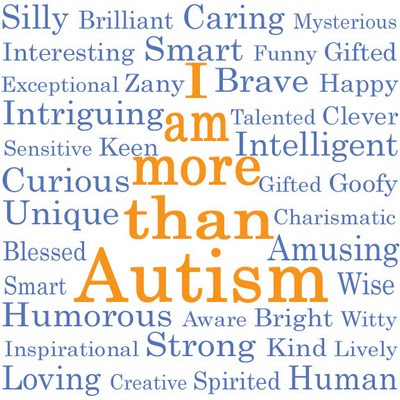Autism myths (and facts).
Just one more thing to love about the organization that I work for:
As part of their campaign to increase awareness about Autistic Spectrum Disorders the NAS has been posting facts and misconceptions about autism on Facebook and Twitter. These posts address how we define ASDs, as well as our understanding of many of the behaviors associated with them. Here is a sample of what they have posted so far.
#AutismMyth: Stimming (repetitive behaviour like flapping or rocking) is undesirable and should be stopped
#AutismFact: Repetitive behaviour like flapping or rocking can help some people with autism deal with chaotic environments or stress. Stimming can be a healthy method of personal expression & sometimes communication for people with autism
#AutismMyth: Autism is a mental health condition.
#AutismFact: Autism is a lifelong neuro-developmental condition which exists along a spectrum.
#AutismMyth: Asperger syndrome is a middle class condition made up by parents to excuse the bad behaviour of their children
#AutismFact: Asperger syndrome is a real and disabling condition that has its own set of diagnostic criteria**
#AutismMyth: All people with autism spectrum disorders have a low IQ
#AutismFact: Not all people with autism have a learning disability
#AutismFact: People with Asperger Syndrome, a form of autism, often have average or above intelligence
#AutismMyth: People with autism are deliberately being rude when avoiding eye contact
#AutismFact: Some people with autism find it difficult/physically painful to make eye contact
#AutismMyth: All children and adults with autism prefer to spend their time alone
#AutismFact: People with autism may want to interact socially but may not naturally have the necessary social skills
#AutismMyth: Children and adults with autism do not care about other people
#AutismFact: People with autism can care deeply about others but may find it difficult to understand how others feel
**Recently, and after long debate, the decision has been made to alter the diagnostic criteria for Autism Spectrum Disorders. This includes the collapse of autism, Asperger's Syndrome and PDD-NOS into a single category - Austism Spectrum Disorder (i.e., Asperger's Syndrome will no longer exist as a separate diagnosis). An interesting article on this change, by one of the leading individuals in autism research: http://www.nytimes.com/2009/11/10/opinion/10baron-cohen.html?_r=0
Understanding autism is an ongoing process for those on the spectrum, for experts, and for society alike. Taking the time to learn a little more about a seemingly ever growing portion of the population can make all the difference for those with autism, and for the people that care about them. The most important thing to remember is that a diagnosis of autism does not negate or replace a person's individuality. Everyone is unique and is defined by a unique history, personality, and set of interests. This fact is just as true for those on the spectrum. This is what makes every day different for me. This is what makes my job and the people I work with so interesting. And I am so grateful for that.
Love.


Comments
Post a Comment